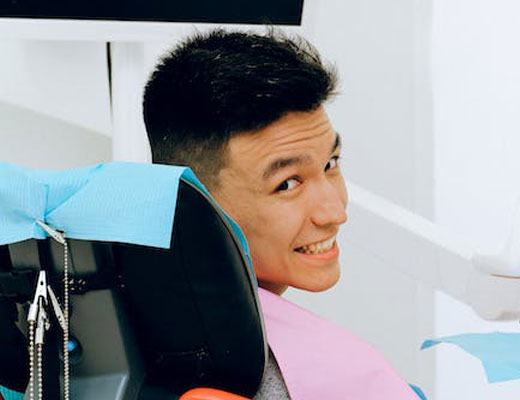Surgical Instruction

Before Sedation
- No eating or drinking, including water, for 8 hours before the procedure.
- Arrange for a responsible adult to accompany you, stay throughout the procedure, and drive you home. They will also assist with medication pickup and care afterward.
- If necessary, consult your oral surgeon about taking routine medications before the surgery. If advised, take them with a small sip of water.
- Bring your inhaler, if you are asthmatic, on the day of surgery.
- After the procedure and anesthesia avoid operating machinery or driving for 24 hours. Expect feelings of drowsiness, lightheadedness, or emotional sensitivity, which will diminish within hours.
- Your designated driver should assist with medication pickup and ensure you’re comfortable at home.
Tooth Extraction Post Operative Expectations
Bleeding
- After extractions, a small amount of bleeding is normal and can persist for several hours.
- Place two damp gauze pieces over the extraction site to control bleeding and bite gently for 30-60 minutes, ensuring pressure. Although it is tempting to talk, especially after sedation, please try to limit the amount of mouth movement via talking directly after the procedure.
- If bleeding persists, use gauze for another 30 minutes.
- Pink or blood-tinged saliva for up to 24 hours is normal. A small amount of blood mixed with saliva can appear to be more blood than in reality.
- Rest with your head elevated.
Inflammation
- After a surgical procedure, the body’s natural response is to experience inflammation as a part of the healing process. Swelling is often most noticeable the day after the procedure and reaches its peak within 2-3 days. While it is expected to decrease after this initial period, it may take a week or more to subside entirely depending on your case. Applying an ice pack to the affected area is recommended to minimize swelling. For the first 48 hours, use the ice pack on and off for 20 minutes, then switch to a warm compress after 48 hours.
Discomfort
- Discomfort often accompanies an oral surgery procedure. Non-steroidal anti-inflammatory drugs (NSAIDs) like Ibuprofen are the first line for pain management after tooth extraction. Prescription pain medication can be necessary for specific situations.
- If you are on Plavix or Coumadin, avoid Ibuprofen and Aspirin products. Your discomfort should diminish daily; if not, contact our office.
Dry Sockets
- Dry sockets, or alveolar osteitis, occur when the blood clot at the extraction site dissolves prematurely, exposing the underlying bone. This can lead to intense pain and delayed healing but is not an infection.
- To prevent dry sockets:
- Follow post-operative care instructions from your oral surgeon, including avoiding smoking and using straws for at least a week
- Avoid vigorous rinsing or touching the extraction site.
- Take prescribed pain medication as directed.
- Maintain good oral hygiene by gently brushing and rinsing with salt water.
- Attend all follow-up appointments for monitoring and further guidance.
Suture Care
After a procedure involving sutures (stitches), properly caring for them at home is essential to promoting healing and preventing complications.
Here are some tips for caring for sutures at home:
- The sutures are absorbable unless otherwise specified and will eventually fall out on their own.
- Keep the area clean: Starting 24 hours after surgery, gently rinse your mouth with Peridex (chlorhexidine) or salt water. Avoid vigorous swishing to prevent disturbing the sutures.
- Remember, you play a vital role in your recovery. Avoid touching the sutures: Refrain from touching or pulling at the sutures with your fingers, tongue, or any objects. This helps to prevent complications and ensures a smooth recovery
- Follow dietary restrictions: Stick to soft, cold foods and avoid hot, spicy, or hard foods that can irritate or dislodge the sutures. It is also important to remember that you may be numb on both sides of your mouth following any oral surgical procedures.
If you notice excessive bleeding, severe pain, swelling, or signs of infection around the sutures, contact your oral surgeon promptly for further guidance and evaluation. Proper home care of sutures is crucial in ensuring a smooth recovery after oral surgery.
Numbness
Experiencing numbness after an oral surgery procedure is a common and typically temporary side effect caused by the dental anesthesia. The anesthesia used during your procedure is designed to block nerve signals, providing pain relief and comfort while the dentist works. As the anesthesia wears off, you may continue to feel numbness in the treated area for a few hours. This is normal and should gradually subside on its own.
Activity & Healing
- Rest is advised for the initial 24 hours post-surgery, abstaining from physical exertion. After this period, gradually resume activity as comfortable. Returning to school or work is permissible, provided pain medication is not being taken.
- Expect temporary bad breath, which will resolve with healing progression. Within 2-3 days, you may notice white, possibly hardened tissue at the surgical site, indicating routine healing. Complete recovery of the extraction area typically takes 6-8 weeks.
Dental Implants Instructions
After receiving a dental implant, you play a crucial role in your recovery. Here are some essential care instructions:
- Minimize contact: Avoid touching or disturbing the implant site, especially in the first 2 weeks post-surgery.
- Practice good oral hygiene: Brush and floss gently around the implant site to keep it clean. Use a soft-bristled toothbrush and non-abrasive toothpaste.
- Be cautious with diet: Stick to softer foods in the immediate postoperative period to avoid putting too much pressure on the implant. Chew on the opposite side of the mouth during the initial healing period.
- Attend follow-up appointments: Keep all appointments with your dentist or oral surgeon to monitor and evaluate the implant’s progress.
- Avoid harmful habits: Refrain from smoking, as it can interfere with the healing process and increase the risk of implant failure.
- Monitor for signs of complications: Watch for symptoms such as excessive swelling, bleeding, pain, or signs of infection around the implant site. If you notice any of these, promptly contact your dentist or oral surgeon.
By diligently following these care instructions, you are taking the necessary steps to ensure the success of your dental implant and promote optimal healing.
Bone Grafting Post-op
- To ensure proper healing, please avoid disturbing or irritating the bone graft area.
- Brush your teeth twice daily for regular oral hygiene, but do not brush the graft site.
- Stick to a soft diet for three weeks and avoid chewing on the side of the surgical site.
- Take all medications as prescribed until finished.
- Use the prescribed Peridex rinse as instructed.
- Remember to attend all post-operative appointments at our office.
Wisdom Teeth Post-op
- Manage discomfort: Take prescribed pain medication as directed to alleviate any discomfort. Over-the-counter medications like Acetaminophen and Ibuprofen will be the first line of pain management.
- Apply ice packs: For the first 24 hours, apply ice packs to the outside of your face to reduce swelling and discomfort. Apply for 20 minutes on and 20 minutes off.
- Dietary considerations: For the first few days, stick to soft, cold foods such as yogurt, smoothies, and mashed potatoes. Avoid hot, spicy, or hard foods that may irritate the extraction sites.
- Oral hygiene: To keep the extraction sites clean, maintain good oral hygiene by gently rinsing your mouth with salt water after meals. Avoid vigorous rinsing or using straws, as these can dislodge blood clots and delay healing.
- Rest and recovery: For the first few days, rest and avoid strenuous activities to promote healing. Keep your head elevated while sleeping to reduce swelling.
- Avoid smoking and alcohol: Refrain from smoking and consuming alcohol during the healing period, as they can interfere with the healing process and increase the risk of complications.
- Follow-up appointments: Attend all scheduled follow-up appointments to evaluate healing progress and remove any sutures if necessary.
- Watch for signs of complications: Monitor for excessive bleeding, swelling, persistent pain, or signs of infection, such as fever or pus around the extraction sites. Contact your oral surgeon immediately if you experience any of these symptoms.
Sinus Lift Post-op
- Apply gentle pressure by biting on a moistened gauze pack placed over the wound for at least one hour.
- Do not blow your nose for three weeks. If you need to sneeze, do so with your mouth open to avoid putting pressure on the wound.
- Refrain from smoking for three weeks to facilitate healing.
- Avoid engaging in heavy exercise for 3 weeks to prevent complications.
- Avoid all activities that increase sinus pressure (scuba diving, blowing up balloons, playing certain musical instruments, etc).
- Choose soft foods and chew on the opposite side for comfort during meals.
- Maintain regular oral hygiene, being cautious around the wound area.
- Attend all scheduled post-operative appointments at our office for proper follow-up care.
Take all prescribed medications as directed by your doctor to support the healing process.
Ask About Surgical Instruction in Carmel, IN
.
